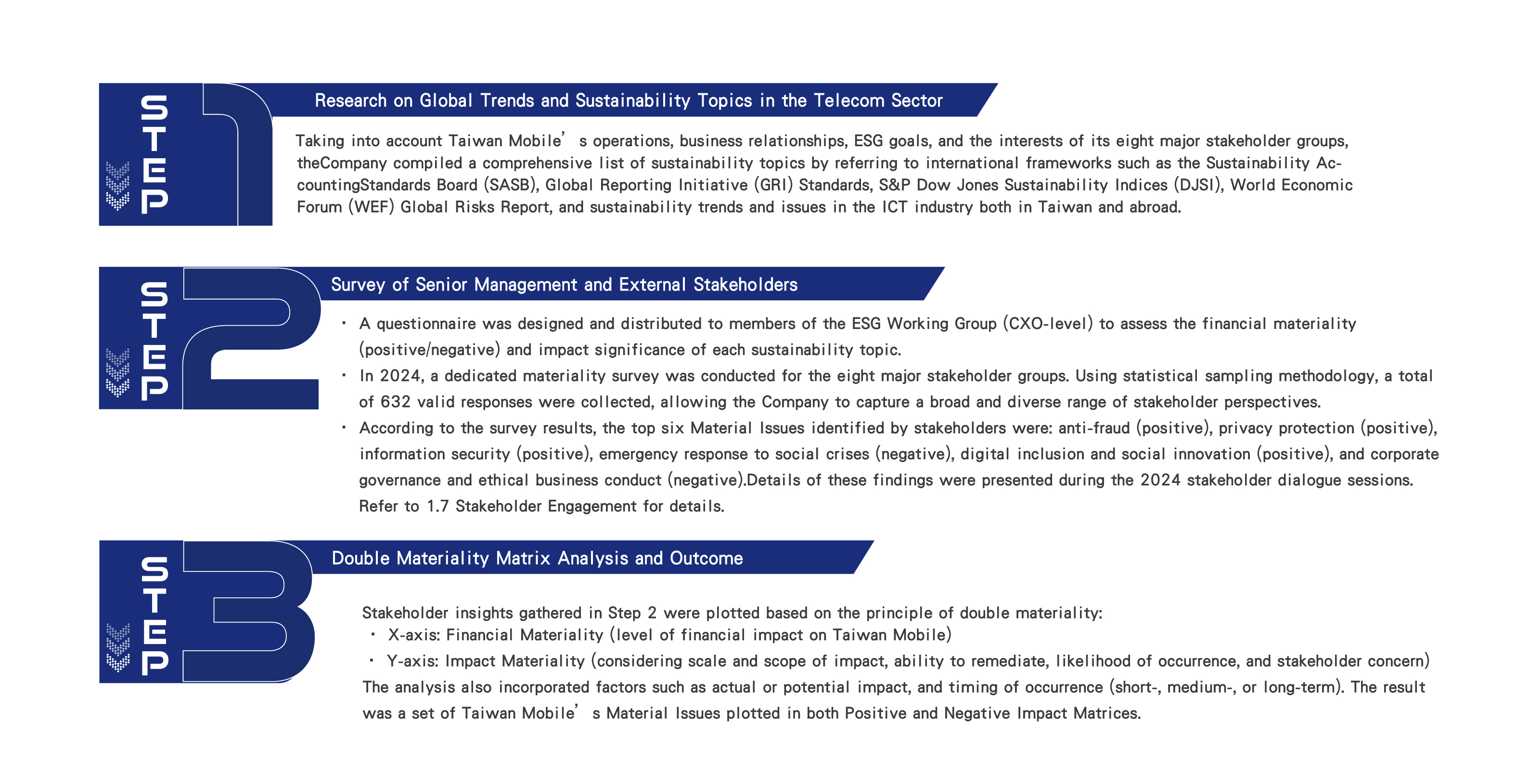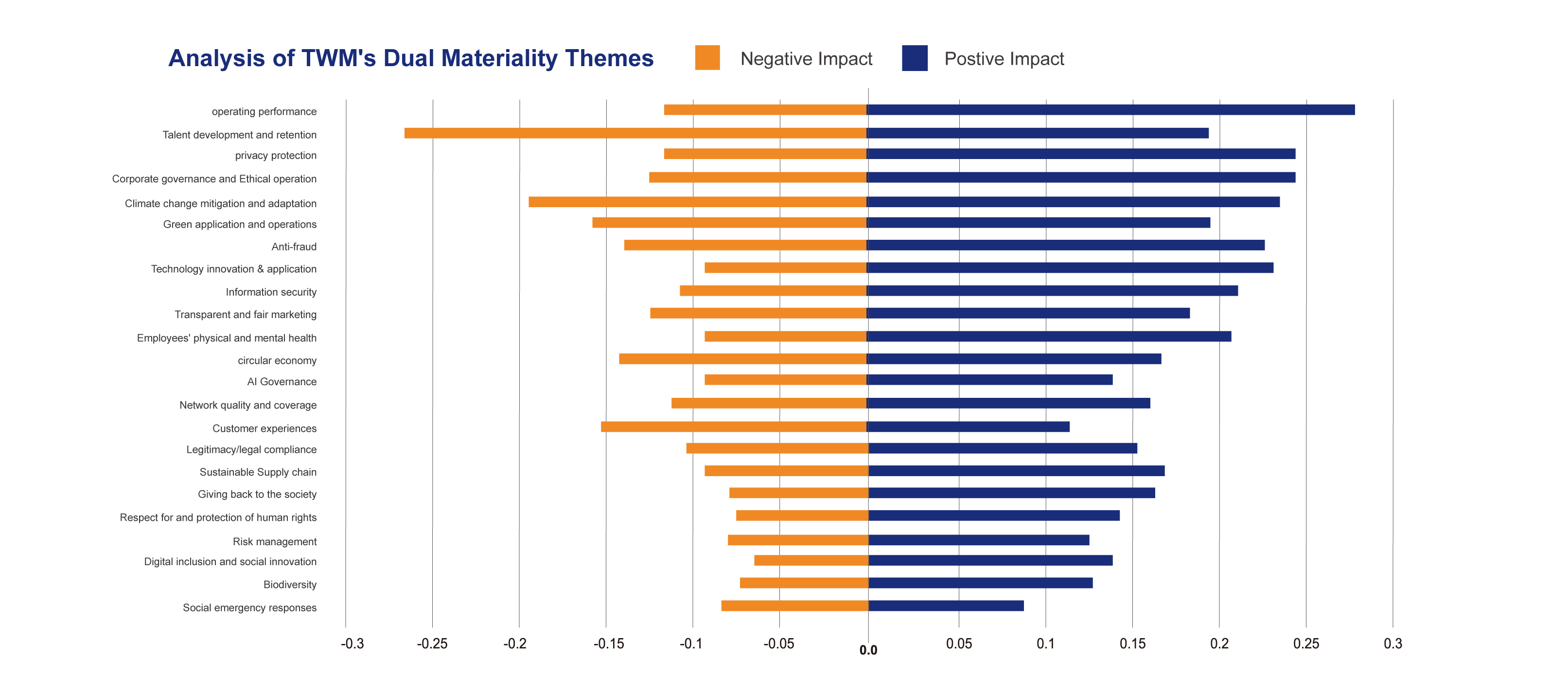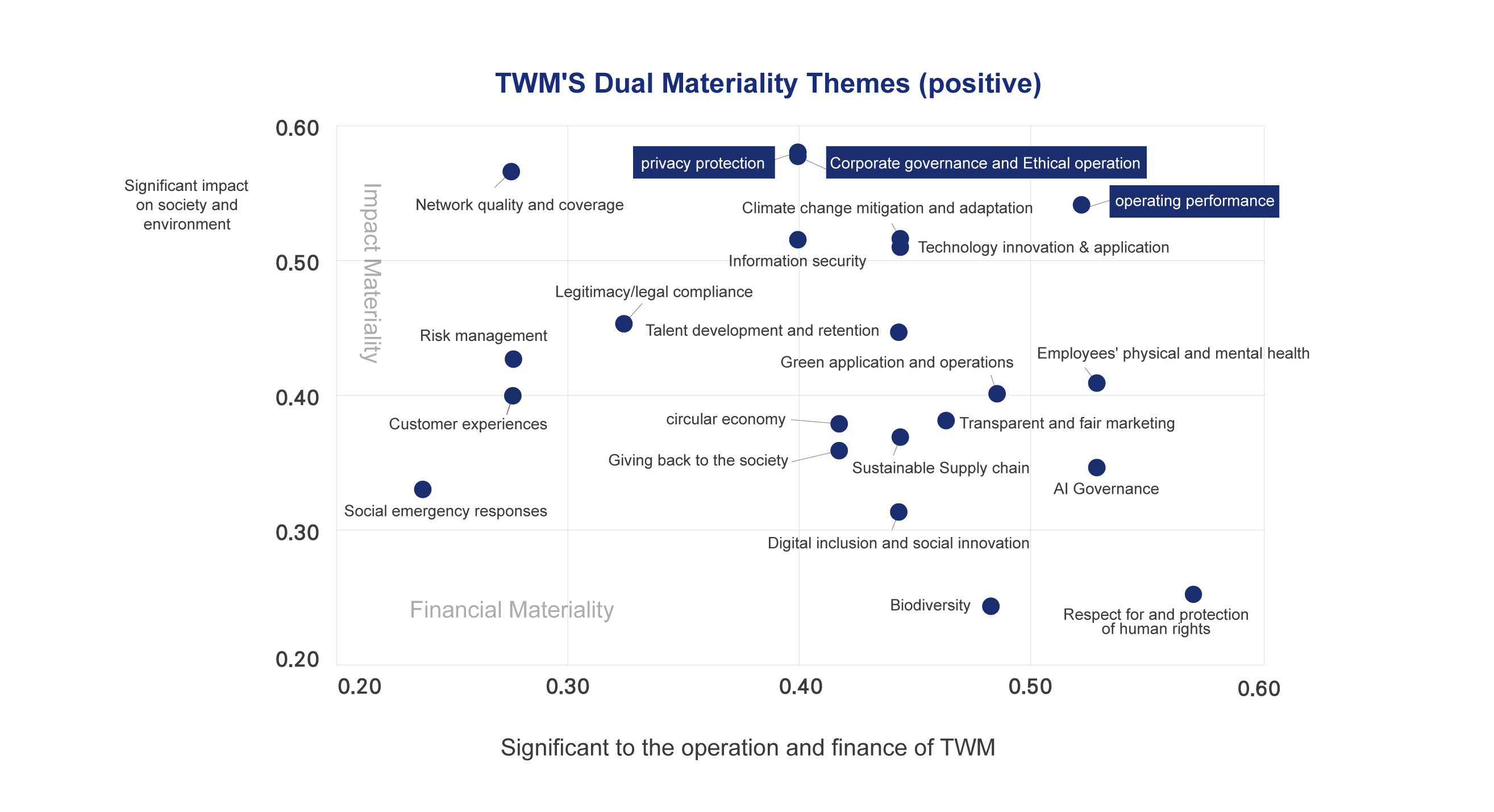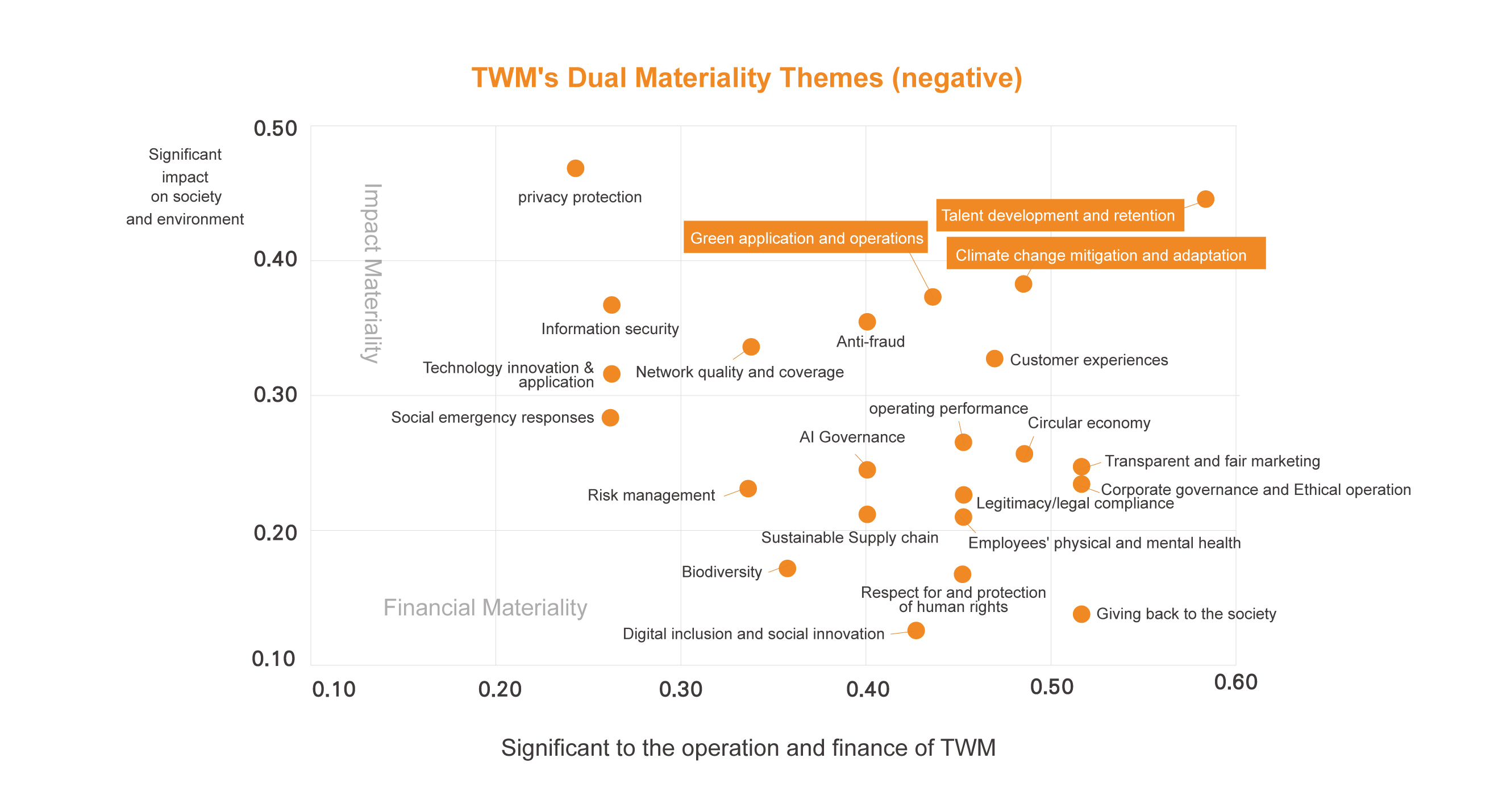
- About Us
- Investor Relations
- ESG
- Product & Service
- Customer Service
Customer Service
- Visiting Taiwan

Taiwan Mobile identifies and assesses material sustainability issues which relates to the environment, governance and social impacts on the organization’s business operation and its internal and external stakeholders.
Based on the three-step identification process, 23 sustainability issues have been summarized in 2024. We conduct and review our materiality analysis at least annually to ensure our material issues align with the global and local trends.
The results of the materiality analysis have been incorporated into the company's Enterprise Risk Management (ERM) process as a key reference. The Risk Management Committee is subsequently responsible for monitoring and strictly controlling risk management-related issues to ensure continuous improvement. In 2024, 19 risks were identified, with 6 of these being included in TWM's Top 6 material issues for the year.
The materiality analysis process is included annually in the sustainability report's assurance scope and has obtained an Independent Limited Assurance Report to ensure the completeness and accuracy of the process.

Taking into account Taiwan Mobile’s operations, business relationships, ESG goals, and the interests of its eight major stakeholder groups, the Company compiled a comprehensive list of sustainability topics by referring to international frameworks such as the Sustainability Accounting Standards Board (SASB), Global Reporting Initiative (GRI) Standards, S&P Dow Jones Sustainability Indices (DJSI), World Economic Forum (WEF) Global Risks Report, and sustainability trends and issues in the ICT industry both in Taiwan and abroad.
A questionnaire was designed and distributed to members of the ESG Working Group (CXO-level) to assess the financial materiality (positive/negative) and impact significance of each sustainability topic.
In 2024, a dedicated materiality survey was conducted for the eight major stakeholder groups. Using statistical sampling methodology, a total of 632 valid responses were collected, allowing the Company to capture a broad and diverse range of stakeholder perspectives.
According to the survey results, the top six Material Issues identified by stakeholders were:
anti-fraud (positive), privacy protection (positive), information security (positive), emergency response
to social crises (negative), digital inclusion and social innovation (positive), and corporate governance
and ethical business conduct (negative).
Details of these findings were presented during the 2024 stakeholder dialogue sessions.
Stakeholder insights gathered in Step 2 were plotted based on the principle of double materiality:
The analysis also incorporated factors such as actual or potential impact, and timing of occurrence (short-, medium-, or long-term). The result was a set of Taiwan Mobile’s Material Issues plotted in both Positive and Negative Impact Matrices.
| Axis | Factors Considered | Assessment Method |
|---|---|---|
| Axis x | Financial materiality |
|
| Axis y | Impact materiality |
|
In 2024, ten members of the ESG Working Group identified 23 key sustainability topics. These topics were further refined by incorporating feedback from both internal and external stakeholders, including the ESG Working Group and 632 valid stakeholder questionnaires, based on the principle of dual materiality, evaluating each topic's "impact on TWM's own operations and finances" and "impact on society and the environment", and ranking the positive and negative dual materiality matrix; the first six key themes are as follows in order:



| Material Issue 1 | Material Issue 2 | Material Issue 3 | |
|---|---|---|---|
| Material Risk or Opportunity impacting company’s business | Climate Change Mitigation and Adaptation | Talent development and retention | Privacy Protection |
| Business Case material to company’s business | Approximately 98% of our GHG emissions come from electricity consumption, which is essential to maintain continuous network operations across our widespread base station infrastructure. Climate change has significantly increased the frequency and severity of extreme rainfall events, especially in subtropical regions like Taiwan. For Taiwan Mobile, this represents a critical operational risk. As a result, extreme rainfall poses the most significant physical climate risk to our business, leading to potential damage to telecom infrastructure, unstable power and water supplies, and service disruptions. These events also generate unplanned maintenance costs and recovery expenses, negatively impacting our operational continuity and customer experience. Given this exposure, Taiwan Mobile considers climate-induced physical risks a material issue that must be proactively addressed through strategic investment, scenario planning, and resilience enhancement. | Taiwan Mobile firmly believes that talent is our most valuable intangible asset and a key driver
of long-term competitiveness. However, in the context of global trends such as declining birth
rates and an aging population, attracting and retaining skilled talent has become increasingly
challenging. In Taiwan, this trend is further exacerbated by the particularly low birth rate, making talent competition in the local labor market even more intense. This demographic shift presents a significant human capital risk, where shortages in workforce capacity or skillsets could impede strategic growth, delay innovation, and increase operational costs. Without proactive investment in employee development, companies risk higher attrition, weakened morale, and increased expenditures on recruitment and training. In particular, career development has emerged as a key factor influencing employees’ decisions to stay. Failure to provide structured upskilling and advancement opportunities could lead to disengagement and loss of critical talent. Conversely, creating an environment that supports long-term career growth can reduce turnover risks and sustain organizational resilience in a highly competitive labor market. . |
As digital services proliferate—especially in areas such as mobile payments, cloud computing,
and AI-driven applications—data privacy has evolved from a compliance necessity to a competitive
differentiator. For Taiwan Mobile, safeguarding customer data is not only foundational to
maintaining our license to operate, but also essential for building trust and expanding in
high-growth digital markets. To address this, Taiwan Mobile has established a comprehensive privacy governance framework, underpinned by dual ISO certifications (ISO 27001 for Information Security and ISO 27701 for Privacy Information Management). Our Cyber Security and Data Privacy Protection Committee, chaired by the President and overseen by independent directors, ensures Board-level accountability and cross-functional integration. Key privacy controls are embedded across our business operations, supported by 24/7 cyber monitoring and a “Privacy by Design” approach in product development. Recognizing privacy protection as a strategic opportunity, Taiwan Mobile has actively leveraged its strong cybersecurity infrastructure to develop a suite of privacy-enhancing services. These include the OP Scam Buster – Enterprise Edition, OP Scam Buster – Personal Edition, and the Number Masking Service, which empower customers to protect their personal information and reduce exposure to scams. These services not only mitigate individual risk but also strengthen our brand as a trustworthy digital service provider. By transforming privacy protection into an integrated service offering, Taiwan Mobile creates new revenue streams and customer value, while reinforcing its leadership in digital trust and responsible innovation. |
| Business Impact | Risk | Risk | Opportunity |
| Business strategies | To address climate-related risks and transition toward net-zero emissions by 2050, Taiwan Mobile
has implemented an integrated mitigation and adaptation strategy. This strategy is overseen by the
ESG Steering Committee and operationalized through the Environmental Working Group, with oversight
aligned to our Enterprise Risk Management (ERM) framework and TCFD guidance. On the mitigation front, we have set group-wide science-based targets, including both annual and long-term carbon reduction goals, and a corporate-wide renewable energy adoption roadmap. We actively invest in energy-saving and low-carbon technologies, such as adopting high-efficiency equipment, deploying AI-powered optimization systems, purchasing green electricity, and planning on-site solar PV installations. On the adaptation side, we focus on enhancing the resilience of our telecom infrastructure against extreme weather events. Base stations and telecommunications rooms are equipped with backup batteries, high-weather-resistance power modules, and emergency generators. We continue to expand network coverage in disaster-prone areas while ensuring these sites have sufficient power and mobility resilience, including water storage tanks (with 48-hour capacity), mobile relief vehicles, and climate risk insurance coverage for telecom equipment. Furthermore, we have updated our extreme weather SOPs to strengthen emergency preparedness. These strategies are aligned with our long-term vision—2035 Zetta Connected 2.0—and support our transition to a low-carbon, climate-resilient business model while maintaining uninterrupted service for our customers. |
This approach aligns with our long-term vision of 2035 Zetta Connected 2.0, which emphasizes
human capital as a foundation of sustainable innovation and growth.
To address workforce-related risks and support long-term organizational resilience, Taiwan Mobile
has established a comprehensive talent development strategy centered on learning, engagement, and
internal mobility:
|
To manage the growing risks and unlock the opportunities associated with data privacy in a
digital-first environment, Taiwan Mobile has implemented a comprehensive, multi-layered strategy
focused on governance, prevention, and innovation:
|
| Target /Metric | Taiwan Mobile has set a clear decarbonization pathway aligned with international frameworks such
as SBTi, RE100, TCFD, and TNFD. Our near- and long-term emission reduction targets encompass both
direct and indirect emissions, with regular performance tracking and public disclosure. Oversight
of environmental and climate-related strategies is provided by the Environmental Working Group,
which coordinates cross-functional actions and reports to the ESG Steering Committee. In parallel,
we have established resilience targets to mitigate physical climate risks and ensure operational
continuity. Targets and Metrics:
|
To retain talent and mitigate the risks associated with an aging population and declining birth
rate, Taiwan Mobile continuously monitors employee engagement and turnover trends, and implements
talent development initiatives with quantifiable targets and metrics. Targets and Metrics by 2035:
|
Recognizing data privacy as a fundamental pillar of digital trust, Taiwan Mobile integrates
privacy risk controls into its business operations through ISO-certified systems, real-time
monitoring, and robust governance. The Cyber Security and Data Privacy Protection Committee, led
by a dedicated Chief Information Security Officer (CISO) and including independent director
participation, oversees company-wide privacy and cybersecurity strategies. Cross-functional
working teams execute operations and report regularly to the Board. Key performance indicators are designed to track effectiveness in data protection, breach prevention, and employee awareness. To ensure robust privacy protection and unlock long-term business opportunities in data security, Taiwan Mobile has set the following targets and metrics, with both annual performance benchmarks and long-term strategic goals aligned with the 2035 Zetta Connected 2.0 vision. Long-term Targets (by 2035):
|
| Target Year | 2035 | 2035 | 2035 |
| Progress | The Environmental Management Working Group holds biannual meetings to track environmental
performance, identify areas for improvement, and coordinate company-wide action. In 2024, the
progress on climate-related targets is as follows:
|
In 2024, Taiwan Mobile made significant progress in advancing its talent development and
retention strategy, as reflected in the following key performance results:
|
In 2024, Taiwan Mobile continued to strengthen its privacy protection practices and achieved the
following outcomes:
|
| Executive Compensation | Climate-related KPIs are integrated into the ESG performance indicators of senior management.
These include key metrics such as carbon emissions reduction, renewable energy usage, and the
implementation of resilient infrastructure across core server rooms. In 2024, ESG performance—specifically Talent development and retention-related performance—was linked to 30% of senior executives’ variable compensation. |
The employee training hours and employee engagement targets are integrated into the ESG
performance indicators of senior management. In 2024, ESG performance—specifically Talent development and retention-related performance—was linked to 30% of senior executives’ variable compensation. Recognizing the materiality of Talent development and retention -related issues to the company, starting from 2025, the achievement of ESG KPIs will be fully (100%) linked to the variable compensation of senior management. |
Privacy-related KPIs are integrated into the ESG performance indicators of senior management.
These include key metrics such as the prevention of personal data breaches, maintenance of ISO/IEC
27001 and 27701 certifications, 100% completion rate of employee privacy training, effectiveness
in blocking unauthorized data transmissions , and user adoption of related products and services,
such as the OP Scam Buster – Personal Edition. In 2024, ESG performance—specifically data privacy and cybersecurity performance—was linked to 30% of senior executives’ variable compensation. Recognizing the materiality of privacy protection to the company’s long-term trust and operational integrity, starting from 2025, the achievement of ESG KPIs will be fully (100%) linked to the variable compensation of senior management. |
| Impact 1 | Impact 2 | |
|---|---|---|
| Material Issue for External Stakeholders | Climate Change Mitigation and Adaptation | Privacy protection |
| Cause of the external impact and the coverage of the business activity that has been considered in the assessment. |
Products and services, which is cover over 50% of the business actitvity. | Products and services, which is cover over 50% of the business actitvity. |
| External stakeholder(s)/impact area(s) evaluation | Environment & Consumers/end -users & External employees. Both combined in positive and negative impacts. | Society & Consumers/end -users. Both combined in positive and negative impacts. |
| Topic relevance on external stakeholders | Taiwan Mobile has made concrete commitments to achieving net-zero emissions by 2050 and actively
adopts energy-efficient equipment, develops green products and services to support the low-carbon
transformation of the telecommunications industry. These efforts allow consumers to access
services that are both environmentally friendly and of high quality. In addition, TWM's climate adaptation strategies—such as building disaster-resilient base stations and achieving 100% resilient infrastructure coverage for core server rooms—ensure service continuity during extreme climate events, safeguarding consumers’ communication needs. From a broader value chain perspective, TWM engages its suppliers in GHG inventory and low-carbon initiatives, thereby extending environmental influence and encouraging sustainable practices across the industry. However, global warming and intensified typhoons continue to pose significant physical risks. Outdoor telecom infrastructure is increasingly vulnerable to damage, which could result in service disruptions, negatively affecting consumer experience and TWM’s market competitiveness. |
As digital services such as mobile payments, cloud computing, and AI applications continue to
expand, data privacy has become a critical concern for consumers and society at large. People
increasingly rely on digital infrastructure to manage their daily lives, which elevates the
expectations for data protection and transparency across all industries, especially
telecommunications. On the positive side, Taiwan Mobile leverages its robust privacy governance and cybersecurity infrastructure to offer services that enhance personal data protection for users. These include the OP Scam Buster – Personal Edition, OP Scam Buster – Enterprise Edition, and the Number Masking Service, which collectively reduce fraud risks and improve user confidence in digital services. These innovations not only help individuals avoid financial and emotional harm from scams but also support societal resilience in the face of increasingly sophisticated cyber threats. On the negative side, a single data breach can significantly erode public trust, cause reputational and regulatory harm, and undermine Taiwan Mobile's license to operate. As a telecommunications provider managing vast amounts of sensitive personal data, TWM faces growing risks from social engineering attacks, phishing, and other malicious threats. To address these risks, TWM has implemented a company-wide Personal Information Protection Management System (PIPMS), achieved ISO/IEC 27001 and 27701 certifications, and operates a 24/7 cybersecurity monitoring center—all of which work together to prevent privacy violations and ensure stable, secure services. |
| Output Metric |
|
|
| Impact Valuation | Environmental value lost/ gained | Access to product/service with positive impact provided |
| Impact Metric | NTD -1,010,224,000 | NTD 922,070,000 |